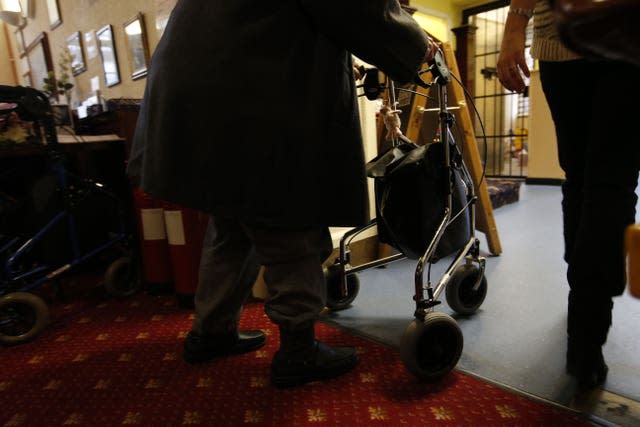Age UK warns of risk to older people being unjustifiably deprived of liberty
Staffing and time pressures in social care risk the “nightmare scenario” that older people could be being unjustifiably deprived of their freedom, Age UK has warned in a new report.
The older people’s charity warned that the system aimed at keeping people safe in care homes “for an alarming number of older people is not working at all”.
Deprivation of Liberty Safeguards (DoLS) are a legal procedure used to keep a person who lacks capacity to consent to their care safe from harm in a care home or hospital, such as those with dementia or mental health problems.
The charity said 84% of people subject to a DoLS application in 2022/23 were aged 65 years or over so problems with the system particularly affect older people.
The estimated number of uncompleted DoLS applications has remained at over 100,000 in recent years, with 126,000 applications having gone uncompleted in 2022/23, it said.
For those that were completed, the process took an average of 156 days, much longer than the 21-day target.
The charity’s report said: “Chronic under-funding of the scheme by central Government has led to serious problems with its local administration, leading to an ever-growing backlog of DoLS cases that is so vast it can now probably never be eradicated.”
The charity said day-to-day management of DoLS “operates in a social care system that is severely underfunded, that cannot meet the demand for services, and which suffers from a significant shortage of staff due to a workforce crisis”.
While waiting times for assessments to be completed are long, Age UK said there is also a risk of some assessments not being thorough enough.

Their research included six family members of people subject to a DoLS authorisation, six care home staff who refer DoLS cases and provide care for people who are subject to DoLS, and eight local authority staff responsible for processing and authorising DoLS cases.
They quoted one family member who said the assessor for her father “barely engaged” with him and that the experience felt like a “box-ticking” exercise.
The report stated: “Such lack of engagement raises questions about whether the current operation of the DoLS process is meaningful, or whether it is effectively operating as a ‘rubber stamp’.”
The report said that if there are too many cases to get through, some assessors might not have time to consider whether there are less restrictive alternatives to depriving the person of their liberty.
It quoted a local authority representative who stated: “Less people will be deprived of their liberty if there is more money.”
The charity called for more funding to be made available to local authorities and for strategies to be put in place to increase the recruitment of social workers with the correct skill set to carry out DoLS assessments.
Caroline Abrahams, Age UK charity director, said: “Personal liberty is part of our birthright and central to our understanding of what it means to live in a democracy, so it is profoundly shocking that so many older people with diminished capacity are living and dying without the proper legal protections for limiting their freedoms being in place.
“As a result, we risk the nightmare scenario that somewhere, there’s an older person locked in their room in a care home, supposedly in their own best interests when, in practice, an objective assessment by a trained social worker would have found this not to be justified at all.
“We have also heard of cases in which a care home is reluctant to constrain the movements of an older person with dementia who is clearly at risk because they wander, without an order saying that this is legally okay.”
The report said system reform has been “effectively kicked into the long grass for a future administration to deal with”.
Ms Abrahams said: “The failure of successive governments to grasp the nettle of ensuring there’s a functioning system for safeguarding older people’s liberty if they lose their mental capacity is symptomatic of their broader failure to reform and refinance social care.”
Kaya Comer-Schwartz, social care spokesperson for the Local Government Association – which represents local authorities, said: “Social care has faced years of chronic underfunding, but councils do their best for communities with resources they have.
“It is disappointing and concerning that the Budget provided no new investment for adult social care.
“People who draw on care and support will be understandably worried about the continuing impact of significant pressures on the service.
“We need to see further urgent investment in adult social care and a boost to the social care workforce, to ensure the best possible care for those that need it.”
A Department of Health and Social Care spokesperson said: “Protecting the most vulnerable is a priority and our current Deprivation of Liberty Safeguards system ensures people who lack the mental capacity to consent can receive the care or treatment they need.
“Backed by an historic funding uplift, we are prioritising efforts to deliver the reforms set out in the Next Steps to Put People at the Heart of Care plan, which include significant investment in the adult social care workforce, technology and support for unpaid carers. All of these encompass support for older people and others who may suffer issues with their mental capacity.”


